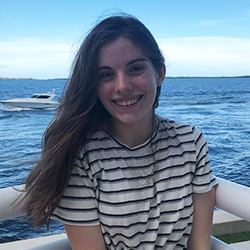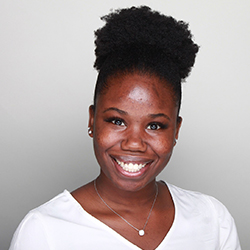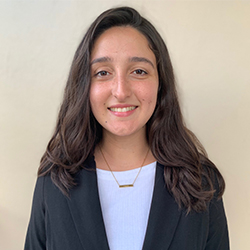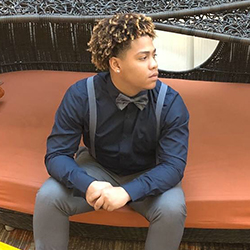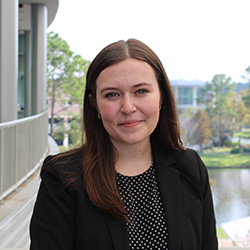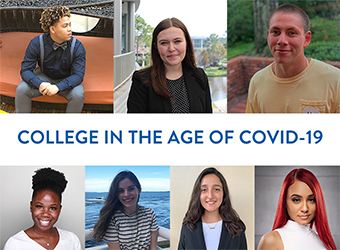 How seven Florida students are coping with the coronavirus
How seven Florida students are coping with the coronavirus
This story is part 2 of FCAN’s College in the age of COVID-19, series, which follows seven college students from around the state as they navigate school, work, and family life in this fall. Read Part 1 here.
For college students, COVID-19 has touched every aspect of life. Beyond the switch to online instruction and a lack of campus life, the pandemic has also exacerbated existing problems for low-income and first-generation students, and brought new anxieties about their futures. Most of our respondents have lost jobs themselves, or had families who lost jobs or income due to the pandemic. With the switch to online learning, students struggle with motivation and feel disconnected from their communities. Yet our students see a bright future for themselves. Even while they acknowledge the future is uncertain, all of our students feel confident in their career aspirations.
For many students, financial aid is more important than ever
When campuses are shut down, all aspects of life are shaken up for students. Across America, students rely on dorms, dining halls, and campus or work-study jobs for their housing, food, and income needs. Students also utilize resources like computer labs, high-speed internet, food pantries, and campus medical centers that they may not have access to at home. Research shows both first-generation and low-income students are already less likely to complete their degrees than their wealthier peers. The pandemic and recession have exacerbated these existing inequalities.
When the pandemic hit, several of our student-participants lost jobs that they relied on. Carlos, a junior at the University of North Florida, was temporarily furloughed from his job at the local casino. In order to make up some of the losses, he decided to start a lawnmowing business. Similarly, Briana, a freshman at the University of Central Florida, lost her summer job at a sandwich shop when the pandemic forced restaurants to close. In her initial plans for the fall, Briana intended to get a job near UCF to earn extra money, but that has changed. Regarding jobs that typically go to college students, Briana noted, “If a college student wanted to apply and get a job, they probably wouldn’t get it over an adult who needs the money.”
Victoria, a senior at Florida International University, pursues professional dance alongside her studies. She danced in the 2020 Super Bowl, alongside Shakira and Jennifer Lopez, and felt her dance career was taking a positive turn. Yet once COVID-19 hit, her dance gigs dried up, and her source of income disappeared. Tracey, a senior at Florida A&M University, was fortunate that she saved money from her past internships and was able to keep her part-time job. To pay for college, Tracey relies upon her Pell grant, as well as multiple additional scholarships to assist with rent, groceries, and other necessities. While many of our students receive financial aid that helps pay for their tuition, other essential college expenses like textbooks, laptops, and groceries are not always covered with financial aid, and can cost students thousands of additional dollars a semester.
Other students have struggled because their family members have lost jobs or paychecks. Scottie, a student at Valencia College, knows a little bit more than most about financial aid. He works as a financial aid ambassador on campus, helping other undergraduates navigate paying for college. For Scottie, his own financial aid is crucial, as he depends upon it to pay for college. Since the pandemic, Scottie notes “I rely more on financial aid now because my mom has become unemployed, so I’ve been in need of that money for rainy-day funds.” Similarly, Andrea’s family has experienced some financial hardships over the past few months. A junior at the University of Miami, Andrea reports that because they have experienced some lost wages, her family has had to reevaluate their budget. Like Andrea and Scottie, about 60% of college students report a family member has had a reduction in income due to the pandemic.
To help students with expenses related to campus closures, disruptions, or COVID-related job losses, many colleges created emergency relief funds. Ally, the Student Body president at UNF, helped support UNF’s Student Emergency Relief Fund, which provides immediate aid to students who have lost their housing, jobs, or ability to pay for school. To receive funds, students apply and must demonstrate need, and can typically get funds within a few days.
Colleges and universities have also received millions in federal funds from the Coronavirus Aid, Relief, and Economic Security (CARES) Act, part of the third federal stimulus package signed into law in March. Schools across the country leveraged their CARES Act funding to set up similar emergency aid opportunities, and for Victoria, FIU’s emergency funds were critical. When the pandemic hit, her family members felt it was too risky for her to come home, and Victoria did not have a place to go. Her family was further experiencing hardship at home – her dad was furloughed for several months and money was tight. While Victoria had financial aid that helped her during the school year, she would not receive any aid in the summer, and she didn’t know how she’d pay for housing. Her mentor told her about the school’s emergency funds, which she applied to immediately. She was approved and received an emergency aid scholarship that helped her afford summer rent.
Our students’ stories illustrate just a fragment of the economic burden college students across the country are navigating. Their stories add to national data that shows nearly two-thirds of students are uneasy about their personal finances as a result of the pandemic. In a survey of over 10,000 college students, over half could no longer afford tuition. Low-income students in particular report skipping meals and an inability to pay rent. Many American students are now considering their major and career pathways through the prism of financial instability. Our student participants share how this new uncertainty has affected their career trajectories.
Navigating an uncertain job market
Although nearly all of our students have been financially impacted by the pandemic, they generally remain confident in their future. Andrea, a junior at the University of Miami, wants to be a doctor more than ever. Watching the sacrifice of front-line workers, Andrea felt inspired to continue on her path in medicine. She shares, “it made the job more enticing to me, it was like wow, look how dedicated they are, I want to be that person.” She was additionally moved by the data that shows COVID-19 disproportionately impacts racial minority groups. She already cared deeply about injustice in the world, and seeing racial disparities in health, Andrea decided, “I want to be a part of that solution.” For Carlos, he initially entered college wanting to be a stockbroker. However, the COVID-19 economic downturn caused him to question that pathway. But even in a volatile economic climate, Carlos still wants to pursue some sort of business pathway, and feels like he has gained a motivation “to remain strong in growing my small [lawn-mowing] business.”
Several of our students pursue fields that may seem difficult to break into, including sports broadcasting, dancing, and journalism. However, even through hardships and uncertain job markets, our students still intend to pursue their planned paths. Tracey, studying journalism at FAMU, has not wavered in her career pathway, and in fact, appreciates the virtual opportunities she has cultivated throughout the pandemic. Victoria, pursuing communications and dance, at first felt that “COVID ruined my idea because we were in quarantine for a few months and I didn’t know what I was going to do with my business and career. However, now in this current moment I feel like nothing can stop me from being successful.”
Although most our student participants are confident in their career pathway, several expressed feelings that they are not as prepared as they should be. A May survey showed 4 in 5 students were very concerned about being able to get the skills or experience needed to get a job after graduation, and our student participants share those feelings. At UCF, Briana feels “I am not being properly trained to handle the journalism industry.” For example, she fears her online speech class does not equal the experience she would gain by taking the class in person. “My speeches have had to be pre-recorded with the only audience member being myself. How is this going to help me feel confident in my chosen profession? It simply won’t.”
Similarly, although Andrea is excited to study medicine, with so many things moved online, “it has been hard for me to get exposure to what I want to do.” She is worried that “COVID has set my plans a year back,” because she is lacking what medical schools traditionally look for: research experience, shadowing experience, and immersive summer programs, each of which have been cancelled or limited due to COVID-19. Andrea acknowledges “there are great online opportunities such as virtual shadowing and conferences, but being constantly through a screen has caused a disconnect between me and the material I am given; through a screen I don’t get that in person connection and contact.”
At FAMU, Tracey also had internships cancelled and moved online. However, through the virtual arena, she had a “window of opportunity to speak to professionals that I may not have the chance to talk to pre-COVID due to schedule flexibility.” Tracey feels excited about her future in journalism, but her post-graduation plans are now in the air. She initially planned to move to a city and try her best to find a job, but now she feels the safest route may be to go home and help her parents with their businesses. “Leaving college debt-free to just get into debt is not the plan that I wanted; it is not the idea.” Moving home would not be unusual – for the first time since the Great Depression, more than half of young adults in the United States are living with a parent.
Students desire meaningful careers, and believe higher education is the path forward
Despite pandemic-related challenges, our students generally view COVID as a bump in the road on their journey to purposeful lives. Briana feels the value of education has increased in the last six months, and she feels more grateful than ever for the in-person education she used to experience. To Tracey, she contends more education may mean more flexibility in hard times, and this made her value education more: “It made me want to learn and know more about everything so that I won’t be behind.” The national trends represent a more mixed picture. An August survey from Third Way shows about half of college students feel higher education is no longer worth the cost. An October Strada survey report with more than 40,000 responses is even more dire, finding fewer than 1 in 5 college students strongly agree their education will be worth the cost.
Our students’ conceptions of a successful life offer some important takeaways. America’s young adults have seen two recessions in their lives, and a national November survey shows 3 in 10 students expect to earn less when they’re 35 because of the pandemic. Fiscal stability is top of mind. Scottie, who is interested in journalism and sports broadcasting, still wants to pursue that path. However, he is also trying to map out backup plans and consider graduate degrees to give himself more options. A successful life for Scottie is “one where I manage to make enough income to where I can provide for my family for generations to come.” To Victoria, “a successful life would be thriving in my [career], to be able to provide for myself and have my own house.”
Yet our students also share a desire to have meaningful careers. For Carlos, “a successful life is a life where I have made a positive impact on the world doing my best at whatever career I pursue as long as I am happy.” Tracey also wants “an impactful position at my job,” alongside “fulfillment/happiness, providing for my family and community and being the best version of myself.” Ally has experienced a lot of stress during this pandemic, and she has realized “I want a job that I enjoy AND that allows me to have an appropriate work-life balance.” Andrea’s words about the value of education offer an important takeaway. To Andrea, the value of education “has grown,” because “everything can be taken away and flipped upside down, but the power of knowledge and the need to learn remains and persists. No one can take that from you.”
Look for the next installment in our series in December, where students will share what they wish education and community leaders knew about their school experience.
RELATED ARTICLES:
College in Age of COVID-19 — Part 1, Part 3
Key takeaways from “Students Speak: Florida Students Share Their Stories of College in the Age of COVID-19”

